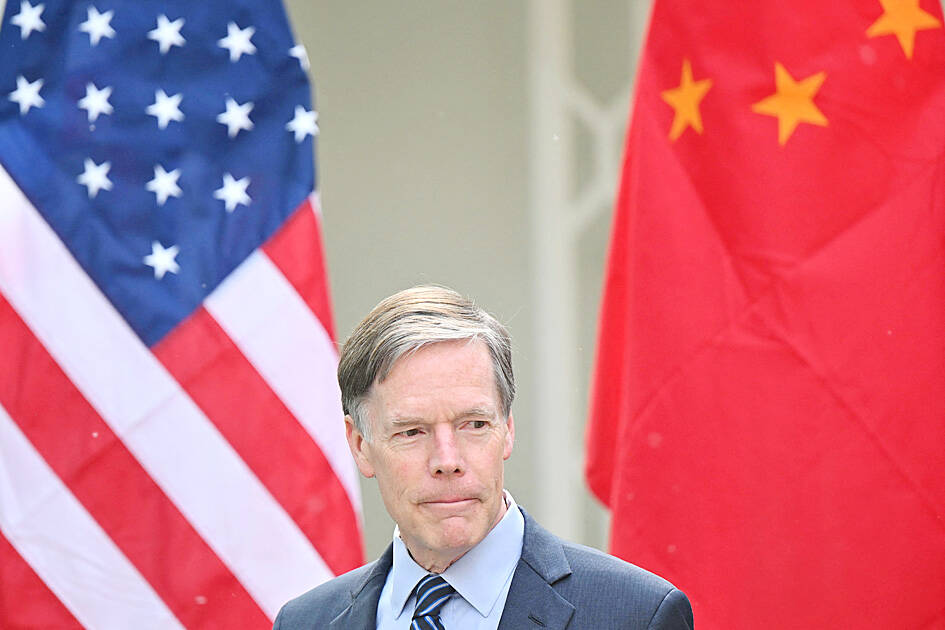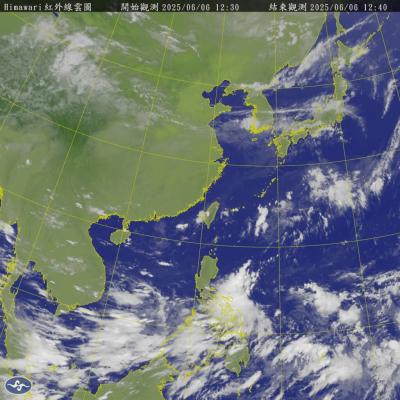Outgoing US Ambassador to China Nicholas Burns said the Chinese government is making a mistake in being so belligerent and intimidating toward Taiwan, and that he believes it would be better for the Chinese government to talk to President William Lai (賴清德).
Burns made the remark in an interview with the Foreign Affairs magazine’s podcast, titled “In the Room With Xi Jinping: A Conversation With Nicholas Burns” released on Thursday last week.
Speaking with Foreign Affairs editor Dan Kurtz-Phelan, Burns, who has served as US ambassador to China since 2022, looks back on the approach of US President Joe Biden’s administration to managing the US’ relationship with China, as the two powers in the past several years butted heads over trade and technology, Russia’s war on Ukraine, and Beijing’s aggression in the South China Sea and the Taiwan Strait.

Photo: AFP
Asked about the Chinese leadership’s intentions toward Taiwan, and how they think about “unification” and their chances, Burns said “there is no question that the Chinese leadership has been very clear about this.”
“They intend to bring Taiwan… what they would say ‘back into the People’s Republic of China,’ but of course the Chinese government has not ruled, from the mainland, Taiwan since 1895,” he said.
“But there is no question that’s the strategic ambition of China. They make that clear every single day, publicly and privately to us,” he added.
“We [the US] have been very consistent with the one-China policy since 1979,” Burns said, adding that the US has also consistently spoken up and told the Chinese government that “they are making a mistake to be so belligerent, and they are making a mistake to try to intimidate Taiwan itself.”
He said therefore the US is exercising its responsibility under the Taiwan Relations Act to provide defensive military technology to Taiwan, and that it has done so in a very vigorous way.
“We also stand up for the principle that these cross-strait differences … have to be resolved peacefully, and we challenge China to do that,” Burns said. “We think that it would be a better step by the government in China to talk to the Taiwan authorities and President Lai, and they refuse to do that.”
Speaking about strengthening the US’ position in the Indo-Pacific, Burns said Japan has been much more outspoken and vigorous on the issue of Taiwan than it had before, as well as the Philippines.
It has also been interesting to see many members of the European parliaments, such as the Bundestag (German federal parliament) and the French National Assembly, flying into Taipei to show political support and humanitarian support for the Taiwanese authorities, he said.
“We’ve obviously got to build up our capacity to deal with any kind of eventuality there … and I think we are in a strong position in arguing to the rest of the world that all of us should insist this problem be resolved peacefully,” Burns said, adding that China refused to do that and asserts that it reserves the right to use force.
He stressed the US has been remarkably consistent on the policy towards Taiwan over the past 45 to 46 years (since the US Taiwan Relations Act was enacted). Every administration and both parties agree on this policy, because it has worked, and they hope it would continue to work in the future, he said.
Asked about his level of concerns about a crisis in the Taiwan Strait, Burns said he admires US Indo-Pacific Commander Admiral Samuel Paparo’s remarks to similar questions, which is “we have to be prepared every day,” and not think about timelines of five, 10 or 15 years from now.
The US is powerful, but that is largely a function of the US’ alliance relationships that multiply its power, especially in the Indo-Pacific, where the US’ treaty allies — Japan, South Korea, the Philippines, Thailand and Australia — have expanded the power of the US, he said.
Many people want to measure who is stronger in the competition between the US and China, including in terms of nuclear weapons, naval power and air force, as well as their economies, but “it’s a false way of measuring power,” because it is China versus the US and all of its allies, Burns said.
“If we are interested in outcompeting the Chinese, as Americans, we must stay close to our allies, not forsaking our allies, not trying to criticize our allies publicly or humiliate them publicly, or contest their own borders and their national sovereignty publicly,” he said.

STAY AWAY: An official said people should avoid disturbing snakes, as most do not actively attack humans, but would react defensively if threatened Taitung County authorities yesterday urged the public to stay vigilant and avoid disturbing snakes in the wild, following five reported snakebite cases in the county so far this year. Taitung County Fire Department secretary Lin Chien-cheng (林建誠) said two of the cases were in Donghe Township (東河) and involved the Taiwan habus, one person was bit by a Chinese pit viper near the South Link Railway and the remaining two were caused by unidentified snakes. He advised residents near fields to be cautious of snakes hiding in shady indoor areas, especially when entering or leaving their homes at night. In case of a

A tropical disturbance off the southeastern coast of the Philippines might become the first typhoon of the western Pacific typhoon season, the Central Weather Administration (CWA) said. The system lacks a visible center and how it would develop is only likely to become clear on Sunday or Monday, the CWA said, adding that it was not yet possible to forecast the potential typhoon's effect on Taiwan. The American Meteorological Society defines a tropical disturbance as a system made up of showers and thunderstorms that lasts for at least 24 hours and does not have closed wind circulation.

ENERGY RESILIENCE: Although Alaska is open for investments, Taiwan is sourcing its gas from the Middle East, and the sea routes carry risks, Ho Cheng-hui said US government officials’ high-profile reception of a Taiwanese representative at the Alaska Sustainable Energy Conference indicated the emergence of an Indo-Pacific energy resilience alliance, an academic said. Presidential Office Secretary-General Pan Men-an (潘孟安) attended the conference in Alaska on Thursday last week at the invitation of the US government. Pan visited oil and gas facilities with senior US officials, including US Secretary of the Interior Doug Burgum, US Secretary of Energy Chris Wright, Alaska Governor Mike Dunleavy and US Senator Daniel Sullivan. Pan attending the conference on behalf of President William Lai (賴清德) shows a significant elevation in diplomatic representation,

Credit departments of farmers’ and fishers’ associations blocked a total of more than NT$180 million (US$6.01 million) from being lost to scams last year, National Police Agency (NPA) data showed. The Agricultural Finance Agency (AFA) said last week that staff of farmers’ and fishers’ associations’ credit departments are required to implement fraud prevention measures when they serve clients at the counter. They would ask clients about personal financial management activities whenever they suspect there might be a fraud situation, and would immediately report the incident to local authorities, which would send police officers to the site to help, it said. NPA data showed